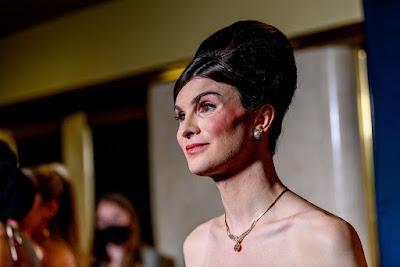I take all things with a grain of salt, including personality type indicators such as the Myers-Briggs Type Indicator. But I do find them interesting and somewhat helpful, the way someone with various mysterious ailments would find a medical diagnosis helpful in explaining why they do the things they do or feel the way they do. Hippocrates put forth the idea of the Four Temperaments in the 5th century BC and many Catholics find this useful in regards to their spiritual life. So using a personality type indicator for personal insight and self knowledge is not at odds with our faith, provided we regard it as a servant and not a master.
The MBTI identifies 16 personality "types" using the following identifiers:
I/E (introverted/extroverted)
S/N (sensing/intuition)
T/F (thinking/feeling)
J/P (judging/perceiving)
I took a test years ago and as it ends up I was an INFJ (introverted-intuitive-feeling-judging). From what I understand, this personality type comprises 2-3% of the general population, which can be a challenge sometimes. I saw a comment once that seemed accurate: "They understand everyone...but no one understand them. The INFJ personality truly is a major gift that comes at a major price." Some of the more peculiar character traits of this type are:
-All-or-Nothing syndrome
-inability to settle
-perfectionism (this isn't a big one for me)
-solitude vs friendship
-contradiction
-writers not talkers
-seeing both the big picture and the details
-empathetic/compassionate visionaries and doers
God made us all different for a reason, and we all have gifts and talents to share with the world; being cognizant of our weaknesses while capitalizing on our strengths can help with that, in my opinion.
I won't go through point by point on these particular INFJ traits for myself, but I've noticed a few things worth mentioning with how it relates to my prayer and community life, as well as how I relate to God.
First off, I think the more we understand the energy aspects of introversion vs extroversion the more experts are recognizing it is not a binary distinction, but rather a spectrum. Personally, I have an introverted core with an extroverted shell, what my wife calls an "extroverted introvert" or ambivert. This actually can come in quite handy because I like talking with new people and being social, but get very turned off by small talk and typically do hone in on one person in large groups to talk to (ideally, about something meaningful). My social battery also does need to be recharged with solitude, with is necessary in the creative process. But I do tend to vacillate between the two: shorter periods (1-3 days) of prayer and solitude are great, but more than that and I'm climbing over the monastery walls; I miss people when I'm around them, but then when I am can get my fill very quickly and desire the solitude again. It's....complicated, haha.
The All or Nothing syndrome is accurate. One silly example is when I was doing the Carnivore diet briefly for a couple days I was already looking up where to buy a whole butchered cow (thankfully, I pumped the brakes since that diet didn't last long). What's helpful to realize, spiritually speaking, is that virtue is the wisdom between extremes. It can also be a challenge because if I'm going to do something, I want to do it completely and well; otherwise, in my mind, it's not worth doing at all. Maybe that's where the perfectionism trait comes in (though I would hardly consider myself a perfectionist in strict terms).
The contradiction trait is probably the hardest one for me--not so much for myself, but because I feel very misunderstood and lonely a lot because it is hard to understand where I'm coming from, or what I really mean when I write. I feel like I'm threading a needle a lot of times with holding this string of tension together, sometimes with two seemingly incongruent ideas (that do relate to one another, however).
I do get very annoyed with people who have lofty ideas but don't carry things out; this is interesting, because I feel like I have both. My wife is a 100% "be-er" and I, by contrast, am a "do-er." I'm as much pragmatic as I am idealistic. When I started a men's prayer and fraternity group at our parish, I had a vision for it, but was very clear with the other men that I started it with that it needs to have structure and consistency to work. We got it off the ground pretty quickly, and it's been going strong for a year now. So, I'm as much concerned with the "forest" big picture as I am about the practical details ("the trees").
In terms of prayer, I think my personality type does lend itself to Adoration, particularly. I'm with my best friend, the Lord, in Adoration, 1:1, in a "feeling" capacity where I don't have to think or be structured. It's a mystical-bent, but very practical as well in terms of the hour spent in this kind of prayer.
I trust my gut. A lot. I don't analyze things like an engineer or a data scientist, but go with intuition 99 times out of 100 with regard to decisions. Also, I have a strange ability to get "vibes" from people within a few moments of meeting them: whether that's a "bad man" vibe or a positive one that draws me in. I've learned to trust this, and it has not let me down often. It can be a little weird sometimes though, because I've had instances when I really get to know someone quickly and they don't even realize it, so you can sometimes anticipate the things they are feeling or are going to say without them always knowing it.
With regards to writing, it is as much a burden and curse as it is a blessing. It is how I feel most comfortable expressing myself and working out my thoughts on things, because I have time to think about what I want to say and can articulate it; I am ok in interviews, but I would never host a podcast or anything like that. So I just try to use it for God's glory and as an oblation, rather than navel-gazing or strictly journaling.
In terms of career, I'm grateful I fell into the field I did because it tends to suit my personality well. I do a lot of data/practical things, but also have a counseling and marketing role, so this adaptability in introversion/extraversion is an asset there. I do a lot of different things each day, which I like (inability to settle, maybe?) I have to feel people out when I'm speaking to them about their programs of interest, where intuition is a boon, as well as the ability to listen rather than speak. And my job is a combination of solitude and interaction, which I like, as well as mission-driven (rather than corporate). So, I'm thankful for all that.
Knowing ourselves is not the end-goal--we know ourselves so we know who we are in Christ and how we can best serve him given the way we were fearfully and wonderfully made. Not to mention understanding others not as "bad" or "difficult," but simply endowed with different personality traits. And we compliment each other as well when we are different--whether that's in a marriage, a friendship, the workplace, or our parishes. God knew what he was doing when He created us! As St. Francis de Sales said, "Be who you are, and be that well."





.jpeg)






